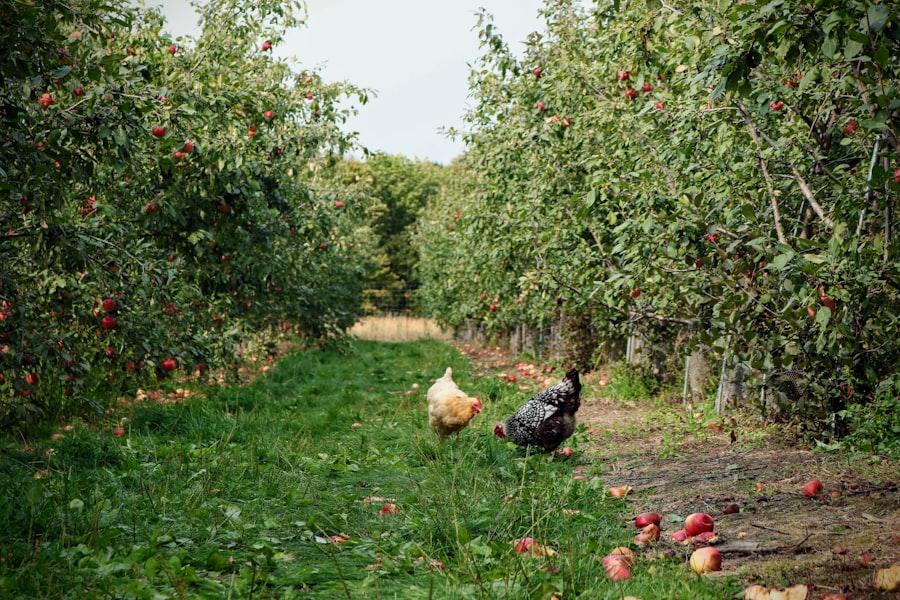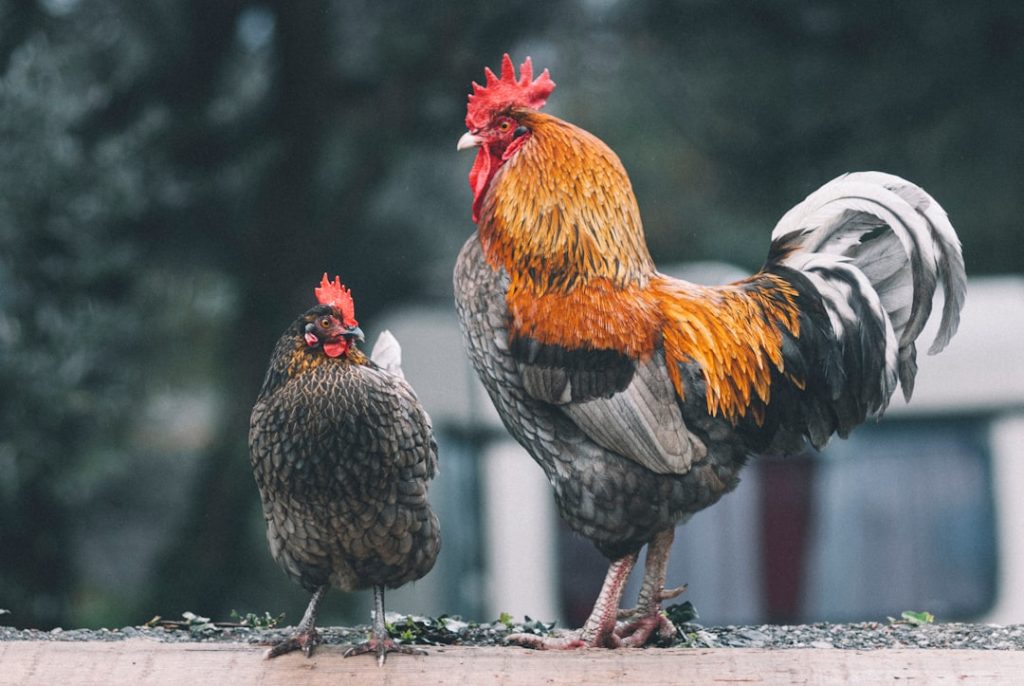Keeping chickens as a hobby has become increasingly popular in recent years. Many people are drawn to the idea of having their own fresh eggs, as well as the joy of watching these quirky creatures roam around their backyard. Not only do chickens provide a sustainable source of food, but they also offer a unique and entertaining experience for their owners.
Key Takeaways
- Keeping chickens has many benefits, including fresh eggs, pest control, and fertilizer for your garden.
- When choosing a breed of chicken, consider factors such as egg production, temperament, and climate adaptability.
- Preparing a chicken coop involves providing adequate space, ventilation, and nesting boxes for your chickens.
- Chickens require a balanced diet of feed and fresh water, as well as occasional treats like fruits and vegetables.
- Understanding chicken behavior can help you identify and address issues such as aggression, egg-eating, and broodiness.
Benefits of Raising Chickens
One of the main benefits of keeping chickens is having access to fresh eggs. There is nothing quite like collecting eggs from your own backyard and knowing exactly where they came from. Fresh eggs are not only delicious, but they also have a higher nutritional value compared to store-bought eggs. Chickens that are allowed to roam freely and eat a varied diet produce eggs that are rich in vitamins and minerals.
In addition to the practical benefits, chickens also bring joy and entertainment to their owners. They have unique personalities and behaviors that can be fascinating to observe. From their funny antics to their social interactions, chickens can provide endless entertainment. Many chicken owners find themselves spending hours watching their flock and enjoying the simple pleasure of being in the presence of these charming creatures.
Another benefit of raising chickens is the opportunity to use their manure as fertilizer for your garden. Chicken manure is rich in nitrogen, phosphorus, and potassium, making it an excellent natural fertilizer. By composting chicken manure and using it in your garden, you can improve soil fertility and promote healthy plant growth.
Choosing the Right Breed of Chickens
When it comes to choosing the right breed of chickens, there are several factors to consider. Different breeds have different characteristics, such as egg-laying ability, temperament, and size. It’s important to choose a breed that suits your needs and lifestyle.
If you are primarily interested in egg production, then you may want to consider breeds known for their high egg-laying capacity, such as Leghorns or Rhode Island Reds. On the other hand, if you are more interested in chickens as pets and companions, then you may want to choose a breed known for its friendly and docile nature, such as Silkies or Orpingtons.
It’s also important to consider the climate and environment in which you live. Some breeds are better suited to cold climates, while others thrive in warmer climates. Researching different breeds and their specific requirements will help you make an informed decision.
Preparing the Chicken Coop
Before bringing home your chickens, it’s important to have a suitable chicken coop ready for them. The coop should provide adequate space for the number of chickens you plan to keep, as well as protection from predators and the elements. It should also have proper ventilation to ensure good air circulation.
You can choose to build your own chicken coop or purchase one that is pre-made. If you decide to build your own, there are many resources available online that provide step-by-step instructions and plans. When building or buying a chicken coop, it’s important to consider factors such as ease of cleaning, accessibility for egg collection, and security.
Feeding and Watering Chickens
Feeding chickens a balanced diet is essential for their health and egg production. There are different types of chicken feed available, including pellets, crumbles, and mash. Each type has its own nutritional value, so it’s important to choose one that meets the specific needs of your chickens.
In addition to commercial feed, chickens also enjoy eating kitchen scraps and foraging for insects and plants in the backyard. However, it’s important to avoid feeding them anything that could be harmful or toxic, such as chocolate or onions.
Providing clean water is also crucial for the health of your chickens. Chickens need access to fresh water at all times, especially during hot weather when they may drink more frequently. It’s important to regularly clean and refill their water containers to prevent the growth of bacteria.
Understanding Chicken Behavior

Understanding chicken behavior is key to providing a healthy and stress-free environment for your flock. Chickens have their own unique way of communicating with each other and with their owners. By observing their behavior, you can learn to recognize signs of stress, illness, or aggression.
Chickens are social animals and thrive in a flock environment. They have a pecking order, which is a hierarchical system that determines the social status of each chicken. It’s important to provide enough space and resources for all chickens to prevent overcrowding and reduce the risk of aggression.
Chickens also have different vocalizations and body language that can convey their emotions and needs. For example, a loud and continuous clucking may indicate distress or danger, while a soft clucking may indicate contentment or communication between hens.
Collecting and Caring for Eggs
Collecting eggs from your chickens is one of the most rewarding aspects of keeping them. It’s important to provide clean and comfortable nesting boxes for your hens to lay their eggs. The nesting boxes should be filled with clean straw or shavings to provide a soft and cozy environment.
When collecting eggs, it’s important to handle them gently to avoid cracking or damaging the shells. It’s also a good idea to wash the eggs before using them, especially if they are dirty. However, it’s important to note that washing eggs removes the protective coating on the shell, so they should be refrigerated and used within a reasonable amount of time.
Keeping Chickens Healthy
Keeping chickens healthy is essential for their well-being and productivity. Regular check-ups by a veterinarian who specializes in poultry can help identify any potential health issues early on. Vaccinations are also important for preventing common diseases such as Marek’s disease or Newcastle disease.
Maintaining good hygiene in the chicken coop is crucial for preventing the spread of diseases. Regularly cleaning the coop, removing soiled bedding, and disinfecting the area can help keep your chickens healthy. It’s also important to provide a clean and dry environment for your chickens to prevent the growth of bacteria and parasites.
Tips for Cleaning the Chicken Coop
Cleaning the chicken coop is an important task that should be done regularly to maintain a healthy environment for your chickens. Here are some tips to make the process more efficient and safe:
1. Wear protective clothing, such as gloves and a mask, to protect yourself from dust and bacteria.
2. Remove all chickens from the coop before cleaning to prevent them from getting in the way or escaping.
3. Start by removing all bedding and soiled materials from the coop.
4. Use a brush or scraper to remove any stuck-on debris or droppings from surfaces.
5. Disinfect the coop using a poultry-safe disinfectant or a mixture of vinegar and water.
6. Allow the coop to dry completely before adding fresh bedding and allowing the chickens back in.
Fun Activities with Chickens
Chickens can be more than just egg-laying machines; they can also be fun and interactive pets. There are many activities you can do with your chickens to bond with them and provide mental stimulation:
1. Train your chickens: Chickens are intelligent animals that can be trained to perform simple tricks or respond to commands. You can teach them to come when called, jump over obstacles, or even play games like soccer.
2. Play with your chickens: Chickens enjoy playing with toys or participating in games. You can create a chicken playground with perches, swings, and tunnels for them to explore and play on.
3. Have a chicken picnic: Set up a picnic area in your backyard and let your chickens roam freely while you enjoy a meal or snack. This allows them to forage for insects and plants while you relax and observe their behavior.
Keeping chickens as a hobby offers a range of benefits, from having access to fresh eggs to enjoying the entertainment and companionship they provide. By choosing the right breed, preparing a suitable chicken coop, and understanding their behavior, you can create a healthy and enjoyable environment for your flock. Regular care, feeding, and cleaning are essential for keeping chickens healthy and happy. And don’t forget to have fun with your chickens by engaging in activities that promote bonding and mental stimulation. So why not consider keeping chickens as a fun and rewarding hobby?
If you’re a young chicken enthusiast and want to learn more about keeping chickens, you’ll love this kid’s guide by Mindie Dittemore. It covers everything from choosing the right breed to feeding and caring for your feathery friends. And if you’re interested in creating a cozy home for your chickens, you should definitely check out this related article on how to insulate a chicken coop. It provides valuable tips and techniques to keep your chickens warm during colder months. You can find the article here. Additionally, if you’re curious about the ideal size for a chicken coop door, this informative article will give you all the details you need. You can read it here. Lastly, if you’re looking for a convenient and secure chicken coop option, the SnapLock Chicken Coop is worth exploring. Learn more about it here. Happy chicken-keeping!
FAQs
What is the article “A Kid’s Guide to Keeping Chickens” about?
The article is a guide for children who are interested in raising chickens. It covers topics such as choosing the right breed, building a coop, feeding and caring for chickens, and collecting eggs.
What are some benefits of keeping chickens?
Keeping chickens can provide a source of fresh eggs, teach children responsibility and animal care, and can be a fun and rewarding hobby.
What are some important things to consider before getting chickens?
Before getting chickens, it is important to check local laws and regulations regarding backyard chickens, choose an appropriate breed for your climate and living situation, and ensure that you have enough space and resources to properly care for the chickens.
What do chickens need in their coop?
Chickens need a clean and dry coop with proper ventilation, nesting boxes for laying eggs, roosting bars for sleeping, and access to food and water.
What do chickens eat?
Chickens eat a variety of foods including chicken feed, grains, fruits, vegetables, and insects. It is important to provide a balanced diet for your chickens to ensure their health and egg production.
How often do chickens lay eggs?
The frequency of egg laying depends on the breed of chicken and their age. Most chickens will lay eggs daily or every other day during their peak laying period, which is typically between 6-18 months of age.
How do you collect eggs from chickens?
To collect eggs from chickens, simply reach under the hen and gently remove the egg from the nesting box. It is important to collect eggs daily to prevent them from becoming dirty or broken.
Meet Walter, the feathered-friend fanatic of Florida! Nestled in the sunshine state, Walter struts through life with his feathered companions, clucking his way to happiness. With a coop that’s fancier than a five-star hotel, he’s the Don Juan of the chicken world. When he’s not teaching his hens to do the cha-cha, you’ll find him in a heated debate with his prized rooster, Sir Clucks-a-Lot. Walter’s poultry passion is no yolk; he’s the sunny-side-up guy you never knew you needed in your flock of friends!







